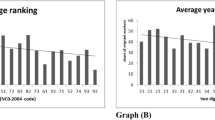Abstract.
Low-wage employment has become a matter of concern in many countries, Portugal being among them. In particular, the extent to which low-wage employment is a permanent or transitory situation is an important issue. This paper examines low-wage mobility in the Portuguese labour market using the bivariate probit model proposed by van de Ven and van Praag (1981), in order to account for the potential endogeneity of the initial state. For this purpose, we use a matched employer-employee panel data for 1996 and 2000. Raw figures show that a significant number of workers are trapped into low-wage employment. We also find that males and the better-educated are more likely to escape from such a situation. Furthermore, initial firm characteristics, such as firm size, age and industry influence mobility. In particular, low-wage workers in larger or in newer firms have better mobility prospects.
Similar content being viewed by others
Author information
Authors and Affiliations
Corresponding author
Additional information
JEL Classification:
J31, J42
Financial support from the Portuguese Science Foundation and FEDER under grant POCTI/ECO/37668/2001 is acknowledged. The author is indebted to an anonymous referee for helpful comments and suggestions. The usual disclaimer applies.
About this article
Cite this article
Cabral Vieira, J.A. Low-wage mobility in the Portuguese labour market. PEJ 4, 1–14 (2005). https://doi.org/10.1007/s10258-005-0038-2
Issue Date:
DOI: https://doi.org/10.1007/s10258-005-0038-2




